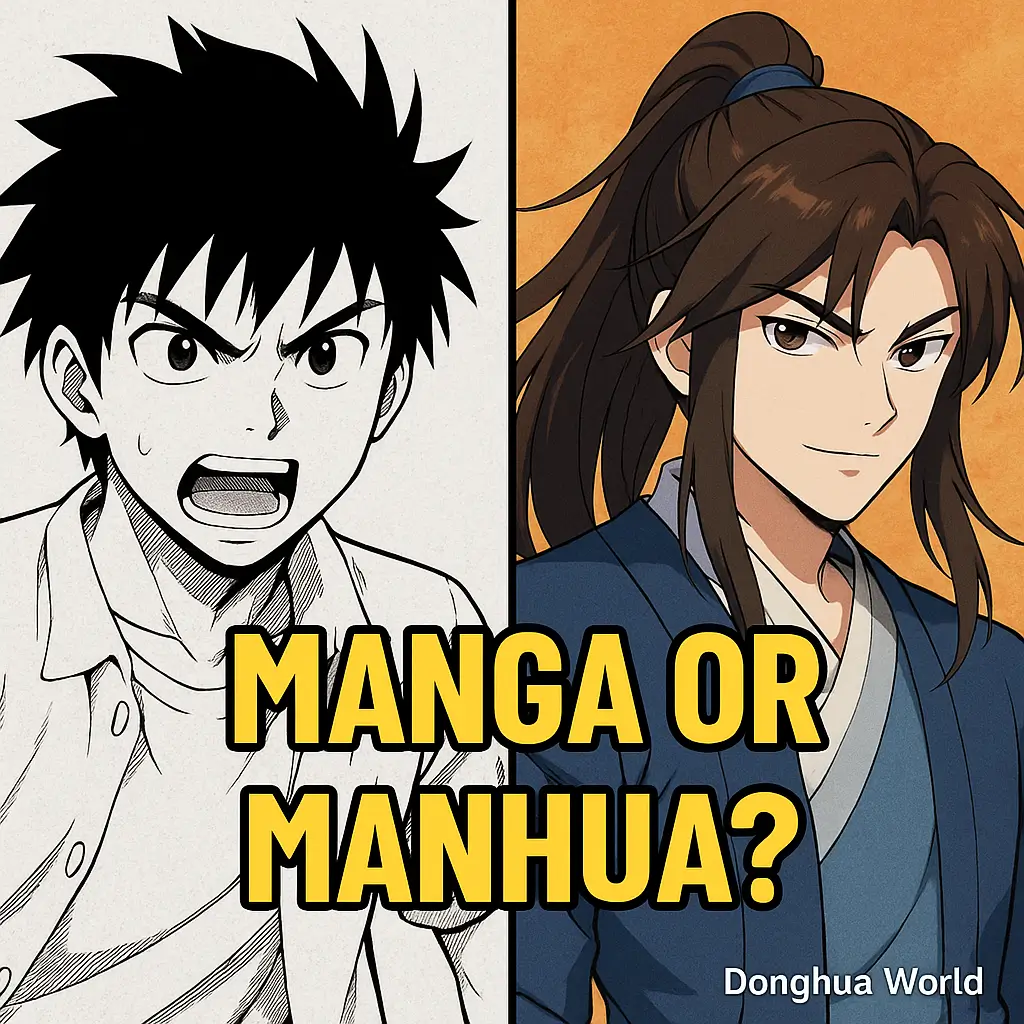In the realm of visual storytelling, both manga and manhua stand tall as powerful mediums. Though often confused due to their visual similarities, manga (Japanese comics) and manhua (Chinese comics) are distinct in their origins, art styles, storytelling approaches, and cultural contexts. As digital platforms make global comics more accessible, readers frequently wonder: which is better, manga or manhua? This article delves into a comprehensive comparison, providing clarity for both newcomers and seasoned comic enthusiasts.
1. Understanding the Basics
What Is Manga?
Manga refers to comic books or graphic novels that originate from Japan. These are typically serialized in magazines before being compiled into volumes. Manga is read from right to left, a format that aligns with traditional Japanese writing.
What Is Manhua?
Manhua is the term for Chinese comic books, primarily produced in Mainland China, Taiwan, and Hong Kong. Manhua is generally read from left to right, similar to Western comics, and may be published in both digital and print forms.
2. Art Style Comparison
Manga Art Style
Manga is known for its detailed line art, expressive character designs, and symbolic use of shading. The black-and-white format is standard, with color occasionally used for special chapters or covers. Characters often have large, emotive eyes, exaggerated facial expressions, and stylized hair.
Manhua Art Style
Manhua, especially web manhua, often employs vibrant full-color illustrations. The art style may lean toward more realistic proportions and less exaggerated facial expressions. The visual presentation is generally glossy and polished, appealing to readers who enjoy colorful artwork.
3. Storytelling and Themes
Manga Storytelling
Japanese manga spans a wide array of genres: action, romance, horror, mystery, slice of life, science fiction, and beyond. Manga typically offers deep character development and long, intricate story arcs. Some notable examples include One Piece, Attack on Titan, and Death Note.
Manhua Storytelling
Manhua often emphasizes themes rooted in Chinese culture and mythology, such as martial arts (wuxia), immortality, cultivation, and historical epics. Popular genres include fantasy, romance, and adventure. Examples include Tales of Demons and Gods, The King’s Avatar, and Soul Land.
4. Cultural Influences
Manga and Japanese Culture
Manga reflects many aspects of Japanese society, including school life, traditional customs, honorifics, and social expectations. Readers often get a glimpse of Japan’s work ethic, hierarchical structure, and emphasis on perseverance.
Manhua and Chinese Culture
Manhua, especially cultivation stories, is steeped in Taoist philosophy, Confucian values, and Chinese folklore. Concepts such as qi (energy), martial arts sects, and immortality play central roles. Understanding these can deepen appreciation of manhua narratives.
- Captivating Charm of Lin Qinzhu in Wu Dong Qian Kun: The Heroine Who Won Fans Hearts
- Spirit Realm Walker: The New Donghua Captivating Global Audiences
- Zhao Tian: A Deep Dive into the Charismatic Character from "Fight for the Throne"
- How to Pick the Best Donghua by Your Favorite Genre
- Unveiling the Epic Saga: A Complete Review of Wu Geng Ji
5. Pacing and Format
Manga Pacing
Manga usually follows a weekly or monthly release cycle. Story arcs unfold gradually, with significant attention given to plot development and emotional build-up.
Manhua Pacing
Manhua, particularly web manhua, is often released in quick, serialized chapters. Some critics argue the pacing can feel rushed, with repeated tropes and filler content. However, the fast pace also keeps readers engaged.
6. Accessibility and Global Reach
Manga’s Global Popularity
Manga has been widely translated and distributed internationally. With a strong presence in bookstores, libraries, and online platforms, manga enjoys global acclaim and is often the gateway for readers into Asian comics.
Manhua’s Digital Rise
Manhua has gained momentum through digital platforms like Webnovel, Bilibili Comics, and Tapas. While not as globally entrenched as manga, manhua is rapidly growing in popularity due to its mobile-friendly format and colorful visuals.
7. Pros and Cons Summary
Manga Pros
- Deep storytelling and character development
- Diverse genres
- Rich cultural representation
- Large international community
Manga Cons
- Black-and-white may deter some readers
- Long arcs can require significant time commitment
Manhua Pros
- Full-color artwork
- Fast-paced, action-oriented plots
- Unique themes like cultivation and Chinese mythology
- Optimized for digital reading
Manhua Cons
- Inconsistent pacing
- Less internationally recognized
- Repetitive tropes in certain genres
8. Reader Preferences: Which One Is Better?
Ultimately, deciding whether manga or manhua is better comes down to personal preference. If you enjoy deep narratives, character growth, and nuanced storytelling, manga might suit you best. On the other hand, if you’re drawn to colorful visuals, fast-paced action, and Chinese mythology, manhua could be your ideal choice.
Some readers enjoy both, switching between manga and manhua depending on their mood. The beauty of today’s comic landscape is the accessibility to both worlds.
9. Conclusion
So, which is better: manga or manhua? There’s no definitive answer. Each offers a unique experience shaped by its culture, art, and storytelling tradition. Manga holds a dominant place globally with its rich legacy, while manhua is an exciting, fast-growing medium bringing fresh perspectives and dazzling art.
As a reader, you don’t have to choose just one. Embrace both, explore different genres, and let your preferences evolve. In the end, the best comic is the one that resonates with you the most.
Final Tip: Try starting with popular titles like Solo Leveling (technically a Korean manhwa but often compared with manhua) or Demon Slayer to get a taste of both worlds before diving deeper.
